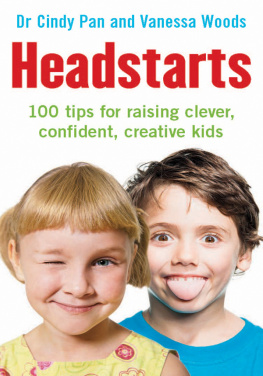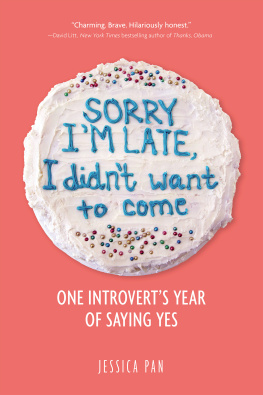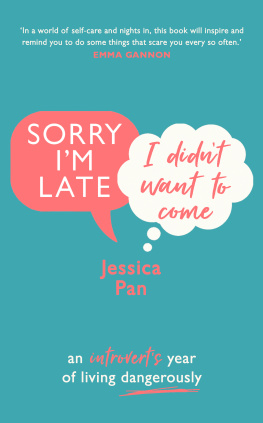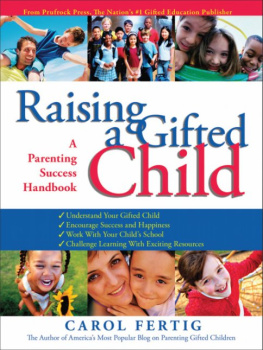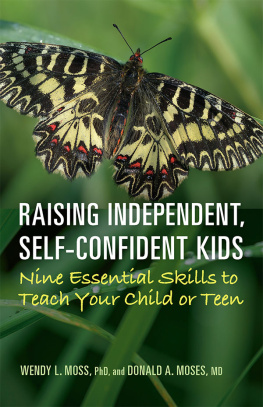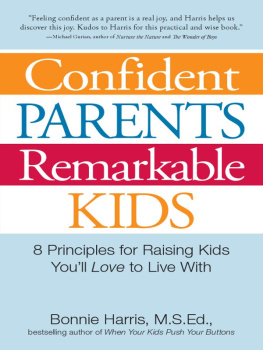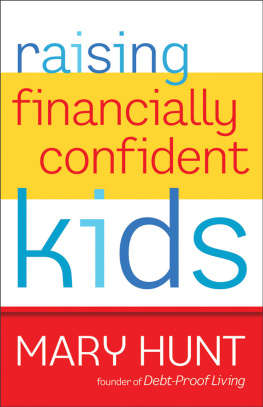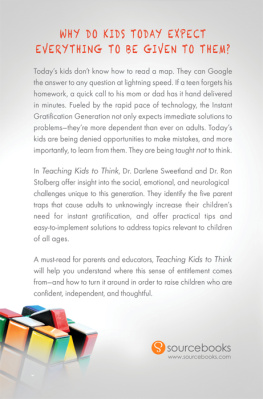Dr Cindy Pan is a medical practitioner, best-selling author and media personality. She has worked in general practice as well as sexual health and womens medicine. She regularly appears on television as well as lecturing, speaking and writing about health, lifestyle and relationship issues. Cindy is the author of Pandoras Box: lifting the lid on lifes little nasties , a book about health, relationships, sex and drugs; as well as Playing Hard to Get about dating in the twenty-first century. She lives in Sydney and has two young children.
Vanessa Woods is an internationally published Australian author and journalist, and is currently a Research Scientist at Duke University in North Carolina. A graduate of the Australian National University with a Masters degree in Science Communication, and an author of childrens books, Vanessa is best known for her research and work comparing the different cooperative behaviours of bonobos and chimpanzees. She is the author of Its Every Monkey for Themselves and Bonobo Handshake.
First published in Australia in 2011
Copyright Cindy Pan and Vanessa Woods 2011
All rights reserved. No part of this book may be reproduced or transmitted in
any form or by any means, electronic or mechanical, including photocopying,
recording or by any information storage and retrieval system, without prior
permission in writing from the publisher. The Australian Copyright Act 1968
(the Act) allows a maximum of one chapter or 10 per cent of this book, whichever is the greater, to be photocopied by any educational institution for its educational purposes provided that the educational institution (or body that administers it) has given a remuneration notice to Copyright Agency Limited (CAL) under the Act.
Allen & Unwin
Sydney, Melbourne,
Auckland, London
83 Alexander Street
Crows Nest NSW 2065
Australia
Phone: (61 2) 8425 0100
Fax: (61 2) 9906 2218
Email: info@allenandunwin.com
Web: www.allenandunwin.com
Cataloguing-in-Publication details are available
from the National Library of Australia
www.trove.nla.gov.au
ISBN 978 174175 574 9
Typesetting and eBook production by Midland Typesetters, Australia
For my darlings, Anton and Jeremy,
with all my love, Cindy-Mummy
Each year there are thousands of studies published about children. Its one of the best-funded, most influential fields of psychology because most people believe, like Whitney Houston once sang, that children are our future.
However, those studies are published in journals that can cost thousands of dollars a year to subscribe to. Occasionally a really big study will make it into the mainstream media, but then youre relying on journalistic spin to decipher it. And then there are all those other studies that get buried in obscure journals that libraries keep in their basements.
We know that todays parents have a million things to do between breakfast and bedtime. We know you want the facts, and so were bringing them to you, free of both scientific jargon and tabloid fear-mongering.
Most of the studies drawn on in this book have been published in recent years. Things change, ideas evolve, and some of what might have been commonly accepted in your parents day (like the idea that sugar makes kids hyper or that Mozart makes them smarter) has been debunked in the new millennium. Some of these studies may well be debunked in the next few decades too, but weve aimed to give you whats current, credible and likely to last the distance. In the interest of readability, weve dropped a lot of the cans, mights, probablys and possiblys that scientists love using. Hardly anything in science is concrete, and most of it is debatable, including many of the things we report here. But even so, these studies have all been published in well-respected, peer-reviewed journals, so youre getting the best of whats out there.
We know that school is becoming more competitive, and you no doubt want your kids to do well. So many of our tips are geared towards giving your kids that little edge in school to get them ahead. But we also know you want your kids to make it to their eighteenth birthday, and to be happy and healthy when they do, so weve also included the latest findings on safety, emotional intelligence and nutrition.
Most of all, we want you to know that youre a great parent and youre doing a fabulous job. These little headstarts are supposed to be like washing machines and vacuum cleaners were to previous generations of parentsmaking your life easier so you can concentrate on having more fun with your kids.
Love,
Cindy and Vanessa
Contents
Introduction
Its got to be-ee-ee-ee, perfect... goes the popular eighties song where a woman sets out the conditions for all her future relationships. Good luck, honey!
For career mums juggling the dual roles of worker and mother, being a perfectionist can be a recipe for stress, depression, conflict and lower overall satisfaction with themselves and life.
Of course there are lots of rewards (such as the thrill of achieving) that come from perfectionist behaviour, features of which might include being organised, hard-working and committed to your goals. But sometimes perfectionists are motivated by guilt, fear of failure, or fear of others disappointment or censure rather than the rewards of a job well done. It is when the fear of negative consequences is greater than the lure of positive ones that this form of perfectionism becomes less healthy, leading to decreased satisfaction and leaving the perfectionist vulnerable to dejection, shame, embarrassment and a generally low mood.
It is important for mums, especially career mums, not to put too much pressure on themselves to be perfect and to realise that sometimes the best outcomes will be achieved by aiming for good enough. Most importantly, setting realistic standards and having the satisfaction of defining and achieving your own goals rather than any socially prescribed standards is the key to a less stressful existence.
[Jacqueline K. Mitchelson, Lawrence R. Burns, Career mothers and perfectionism: stress at work and at home, Personality and Individual Differences, 25 , 1998, pp. 477485.]
Everyone has their own opinion about if and how much women should drink during pregnancy, and the research is no different. If you want a research paper that says drinking a few glasses of wine per week is fine, you can find it. If you want one saying that even one glass a week can cause serious behavioural and academic problems, you can find that too.
What we know for sure is that heavy drinking causes Foetal Alcohol Syndrome, which is the leading cause of mental retardation in the Western world. Some symptoms of FAS are stunted growth, facial deformity and brain damage. What researchers cant decide on is whether heavy drinking is one glass of wine a week or four.
Foetal Alcohol Syndrome isnt all you have to worry about when a glass of wine feels tempting. One study we looked at showed that even drinking one glass of wine a week increased the chances of having a child with depression and a lower IQ (particularly in mathematics).
However, another study showed that mothers who drank between one and two glasses of wine a week had boys with less behaviour problems and girls with less emotional and peer problems.
The problem is that nothing works in isolation. Maybe mothers who drink a couple of glasses of wine a week are more likely to be less rigid in other areas, like discipline and encouraging academic achievement. Maybe these same mothers are less stressed and more willing to take care of themselves and their needs, which has a positive impact on their kids.

